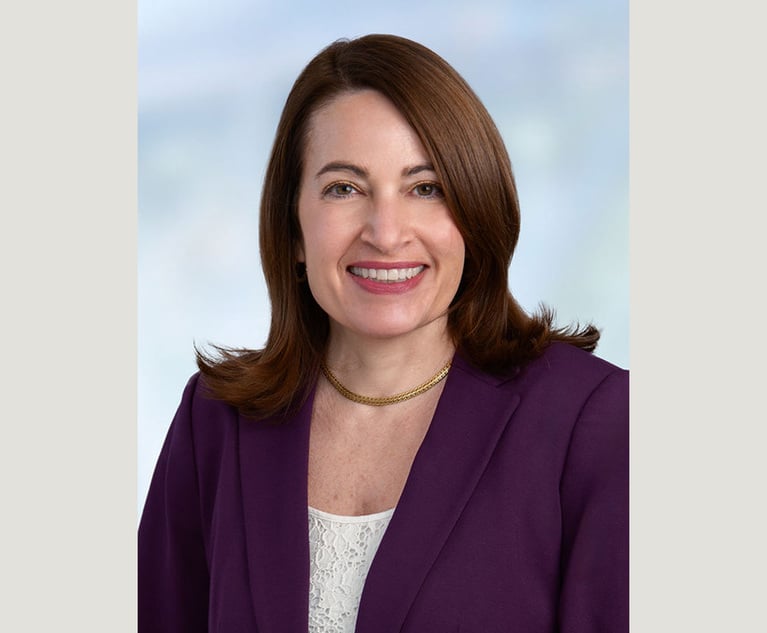US Quarterly Fee Differential Ruled Unconstitutional
Until recently, the amount of the quarterly fees assessed differed depending upon whether a U.S. trustee or bankruptcy administrator was employed in the district where the case was pending.
June 23, 2021 at 12:33 PM
7 minute read
 Patrick M. Ryan, left, and Francis J. Lawall, right, of Troutman Pepper Hamilton Sanders. Courtesy photos
Patrick M. Ryan, left, and Francis J. Lawall, right, of Troutman Pepper Hamilton Sanders. Courtesy photos In addition to judicial oversight, bankruptcy cases are also supervised either through the office of the U.S. Trustee or a bankruptcy administrator. Funding for those programs is generated through quarterly fees taxed against a debtor, which fees over the last few years have risen substantially. Until recently, the amount of the quarterly fees assessed differed depending upon whether a U.S. trustee or bankruptcy administrator was employed in the district where the case was pending. That disparity in the quarterly fees charged has generated consternation among debtors and has given rise to an interesting constitutional challenge as a result.
On May 25, the U.S. Court of Appeals for the Second Circuit reaffirmed the U.S. Constitution's requirement of uniformity in bankruptcy legislation and rulemaking. In doing so, it provided a reminder that while not always at issue, the Constitution's bankruptcy provisions will be dispositive wherever applicable.
This content has been archived. It is available through our partners, LexisNexis® and Bloomberg Law.
To view this content, please continue to their sites.
Not a Lexis Subscriber?
Subscribe Now
Not a Bloomberg Law Subscriber?
Subscribe Now
NOT FOR REPRINT
© 2025 ALM Global, LLC, All Rights Reserved. Request academic re-use from www.copyright.com. All other uses, submit a request to [email protected]. For more information visit Asset & Logo Licensing.
You Might Like
View All


'In Re King': One Is Definitely the Loneliest Number When Filing an Involuntary Petition
7 minute read
Delaying Rent Payment by Assisted Living and Skilled Nursing Facilities in Chapter 11
7 minute readLaw Firms Mentioned
Trending Stories
- 1How I Made Office Managing Partner: 'Always Be Willing to Work Harder Than the Person Next to You,' Says Esther Cho of Stradley Ronon
- 2People in the News—Feb. 10, 2025—Flaster Greenberg, Tucker Arensberg
- 3The Support Center for Child Advocates Welcomes New Executive Director
- 4'Shame on Us': Lawyer Hits Hard After Judge's Suicide
- 5Upholding the Integrity of the Rule of Law Amid Trump 2.0
Who Got The Work
J. Brugh Lower of Gibbons has entered an appearance for industrial equipment supplier Devco Corporation in a pending trademark infringement lawsuit. The suit, accusing the defendant of selling knock-off Graco products, was filed Dec. 18 in New Jersey District Court by Rivkin Radler on behalf of Graco Inc. and Graco Minnesota. The case, assigned to U.S. District Judge Zahid N. Quraishi, is 3:24-cv-11294, Graco Inc. et al v. Devco Corporation.
Who Got The Work
Rebecca Maller-Stein and Kent A. Yalowitz of Arnold & Porter Kaye Scholer have entered their appearances for Hanaco Venture Capital and its executives, Lior Prosor and David Frankel, in a pending securities lawsuit. The action, filed on Dec. 24 in New York Southern District Court by Zell, Aron & Co. on behalf of Goldeneye Advisors, accuses the defendants of negligently and fraudulently managing the plaintiff's $1 million investment. The case, assigned to U.S. District Judge Vernon S. Broderick, is 1:24-cv-09918, Goldeneye Advisors, LLC v. Hanaco Venture Capital, Ltd. et al.
Who Got The Work
Attorneys from A&O Shearman has stepped in as defense counsel for Toronto-Dominion Bank and other defendants in a pending securities class action. The suit, filed Dec. 11 in New York Southern District Court by Bleichmar Fonti & Auld, accuses the defendants of concealing the bank's 'pervasive' deficiencies in regards to its compliance with the Bank Secrecy Act and the quality of its anti-money laundering controls. The case, assigned to U.S. District Judge Arun Subramanian, is 1:24-cv-09445, Gonzalez v. The Toronto-Dominion Bank et al.
Who Got The Work
Crown Castle International, a Pennsylvania company providing shared communications infrastructure, has turned to Luke D. Wolf of Gordon Rees Scully Mansukhani to fend off a pending breach-of-contract lawsuit. The court action, filed Nov. 25 in Michigan Eastern District Court by Hooper Hathaway PC on behalf of The Town Residences LLC, accuses Crown Castle of failing to transfer approximately $30,000 in utility payments from T-Mobile in breach of a roof-top lease and assignment agreement. The case, assigned to U.S. District Judge Susan K. Declercq, is 2:24-cv-13131, The Town Residences LLC v. T-Mobile US, Inc. et al.
Who Got The Work
Wilfred P. Coronato and Daniel M. Schwartz of McCarter & English have stepped in as defense counsel to Electrolux Home Products Inc. in a pending product liability lawsuit. The court action, filed Nov. 26 in New York Eastern District Court by Poulos Lopiccolo PC and Nagel Rice LLP on behalf of David Stern, alleges that the defendant's refrigerators’ drawers and shelving repeatedly break and fall apart within months after purchase. The case, assigned to U.S. District Judge Joan M. Azrack, is 2:24-cv-08204, Stern v. Electrolux Home Products, Inc.
Featured Firms
Law Offices of Gary Martin Hays & Associates, P.C.
(470) 294-1674
Law Offices of Mark E. Salomone
(857) 444-6468
Smith & Hassler
(713) 739-1250





